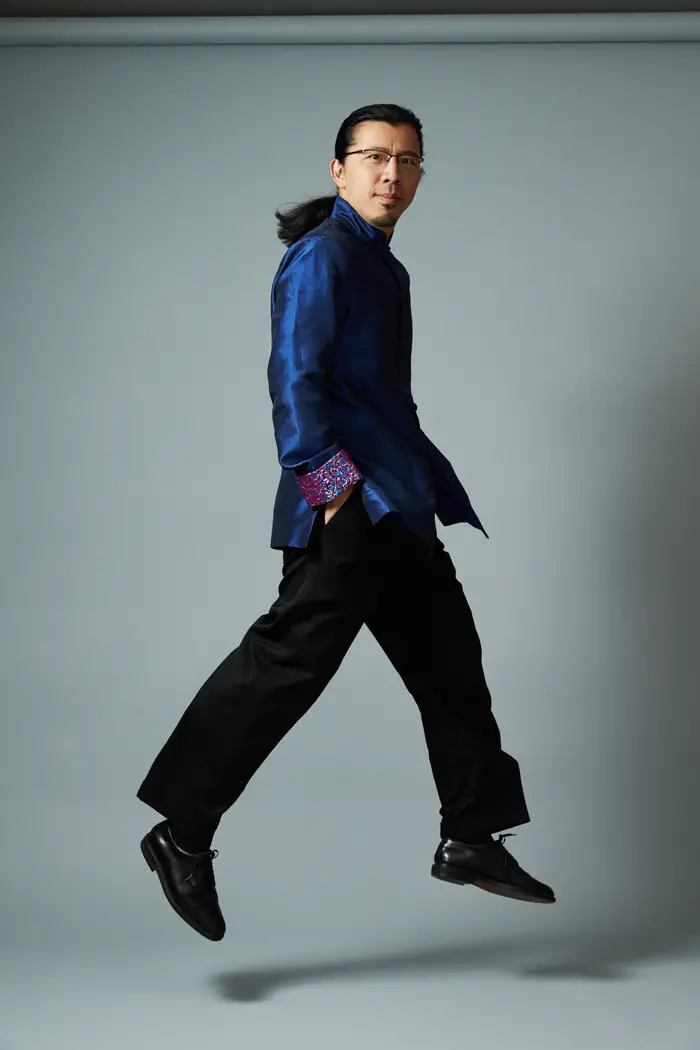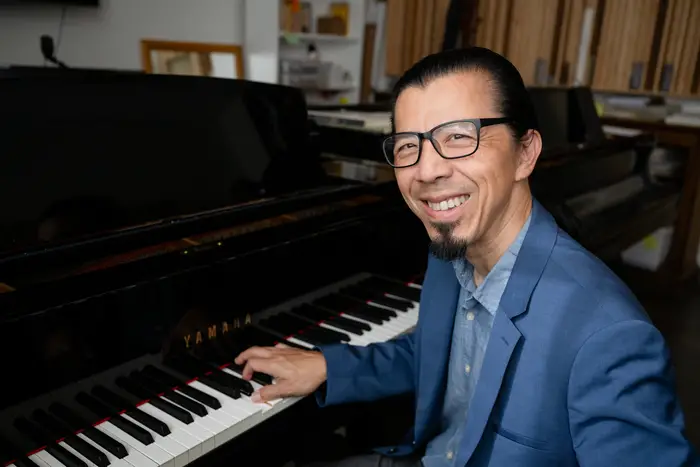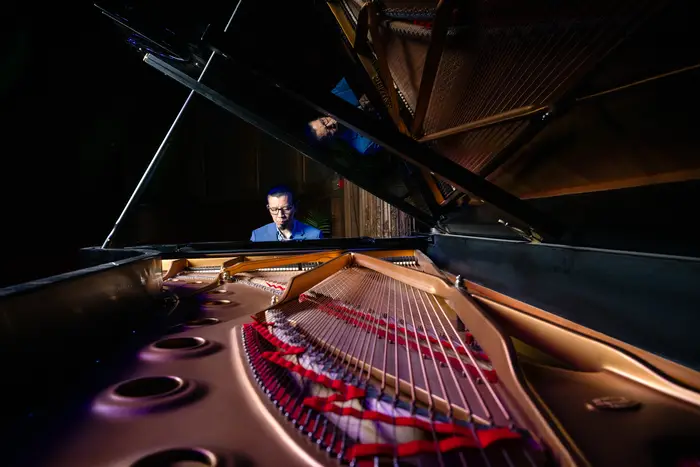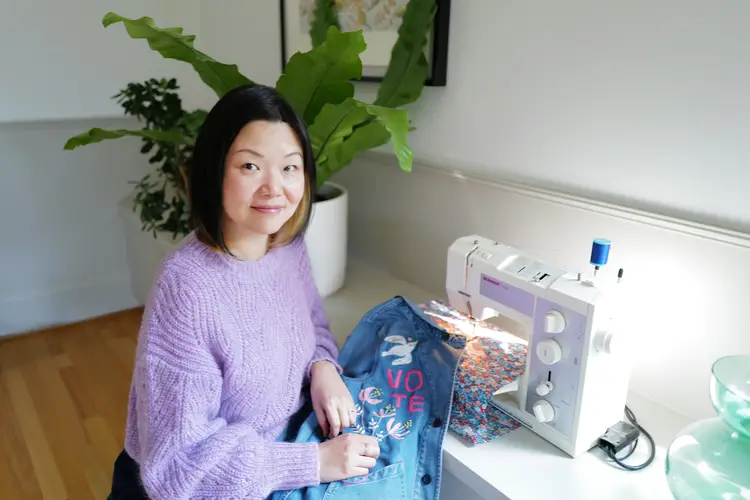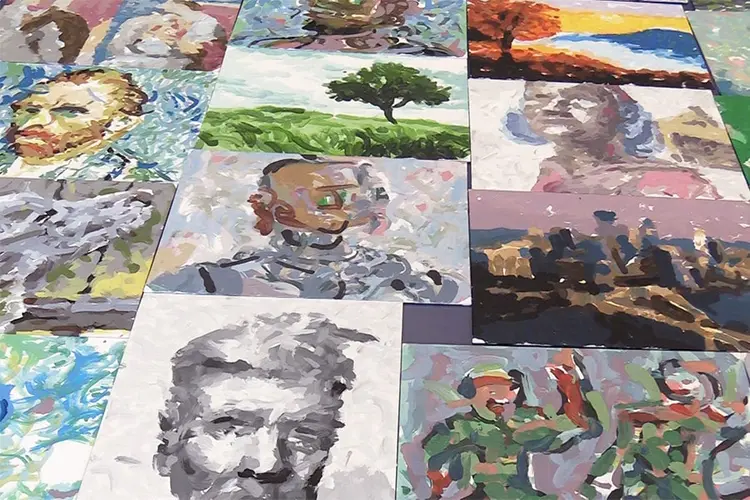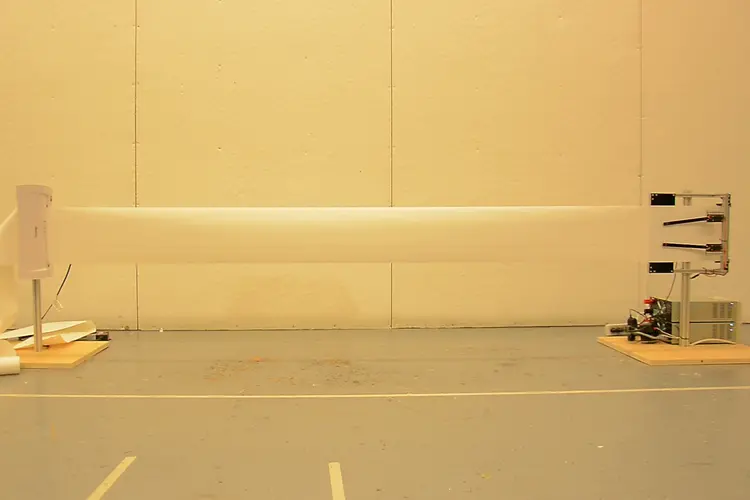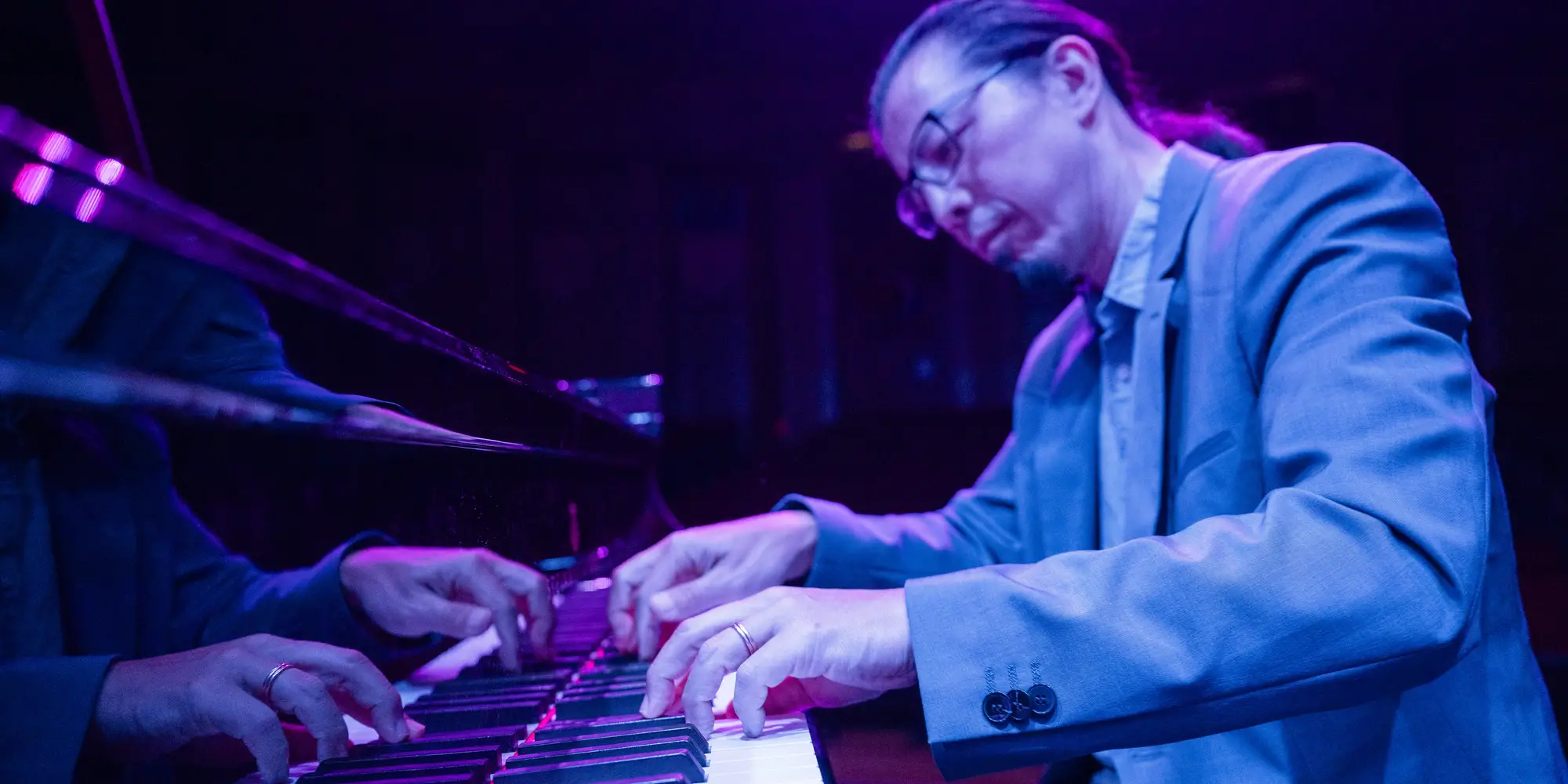
Frederic Chiu: Transforming Music Education with Passion and Innovation
Media Inquiries
His fingers dance across the piano, commanding its keys with the ferocity of a thunderstorm and the precision of a surgeon. His musical performances connect so powerfully with audiences, concert venues erupt in standing ovations for him all over the world.
Branded a maverick(opens in new window) early in his career by The New York Times, Frederic Chiu(opens in new window), an assistant professor of piano in Carnegie Mellon University’s School of Music(opens in new window), is now one of the world's most sought-after concert pianists for his master classes. A nontraditional approach that emphasizes audience engagement, new technologies and interdisciplinary collaboration sets him apart from his peers. With his vibrant concert schedule, a legacy of 30 recordings and countless accolades, Chiu occupies a special place in the world of classical music.
Larsen Vincent, a senior majoring in piano performance, was a Frederic Chiu fan for years before discovering he taught at the university.
“I thought his recordings were absolutely stellar,” Vincent said. “He had such a smart way of approaching music that was also deeply emotional. When I heard he was teaching at CMU, I immediately decided to apply.”
Vincent enrolled in Carnegie Mellon's Bachelor of Science and Arts (BSA)(opens in new window) program so he could also pursue his interest in physics. Chiu said that kind of dual mindset is common among his students, and he has a special appreciation for it, having earned a computer science degree himself while he studied piano at Indiana University.
“My father taught math, physics and computer science throughout my childhood, providing me with extensive exposure to these subjects from an early age. However, it wasn’t something I’d ever considered as a career,” Chiu said. “I learned computer science to learn how to think, how to approach problem solving, and that applied directly to my music making.”
From Paris to pioneer: How an unexpected adventure shaped Chiu’s holistic approach to piano mastery
After earning a Master of Fine Arts degree from The Juilliard School in 1987, Chiu spent a year entering competitions and then moved to Paris for an artist’s residency. Upon his arrival, the program was delayed, and he ended up in a small studio apartment with no piano or even basic amenities for seven months.
Desperate to prepare for concerts and auditions, he sought out pianos through friends, but practice time became sporadic at best. This led him to develop alternative methods of practice that involved score study, meditation and visualization.
Chiu’s unorthodox new practice methods formed the basis for his Deeper Performance Studies program, a holistic and philosophic approach to performance that involves collaborative learning, meditation, deep discussions on performance-related topics and even team cooking exercises.
“I didn’t call it practicing away from the piano at the time, because I didn’t think that was possible,” he said, “but it ended up being this whole regimen of mental and emotional practicing that brought me huge insight into what piano playing was all about.”
The program applies to all musicians and performers, and covers topics like memorization, interpretation, competition and stage fright.
Stage fright is something Ethan Kwong frequently struggled with when he had to play piano in front of others. Kwong is a computer science major planning a career in the field, but he chose Carnegie Mellon primarily so he could continue his piano education.
"I've been playing piano since I was 4 years old. I wanted to continue. It'd be such a waste if I didn't," said Kwong, who likes to play at home or casually with friends.
Chiu’s approach to performance played a major role in helping Kwong rein in those pre-performance nerves.
“We had to get up and perform in front of each other in our studio classes, and Professor Chiu always emphasized that performing should be a learning experience. He taught us we should expect we were going to make mistakes, and to catch them and try to understand why we were making them so we can be better next time. Over the years, that has really stuck with me,” Kwong said.
Kwong describes Chiu as “really creative, both within his own interpretations of music as well as finding ways to teach each student a little bit differently to best fit their needs.”
Later this year, Kwong will get to combine his piano and computer science interests through a capstone project involving the Disklavier, one of many Yamaha instruments that Chiu contributed heavily to the design of as a Yamaha Artist(opens in new window).
Essential qualities of an excellent piano teacher: Insights from a Yamaha Artist
During those seven months in Paris, when Chiu was sans piano, Yamaha invited him to their studios to practice on and test prototypes. Along with other young pianists, Chiu pushed the limits of the instruments and provided feedback, which Yamaha used to improve their designs. As a performer, Chiu has now been a Yamaha Artist for more than 35 years, and he has stayed closely involved with the company’s research and piano artist office.
Chiu is as involved and dedicated to the history of classical music as he is reaching for the future and adopting new technologies. In performing and teaching, he has continually pushed Yamaha’s research and development of various hybrid pianos. The Disklavier in particular, which reproduces the action of the keys and pedals like a player piano, blends traditional acoustic piano mechanisms with modern digital controls for precise playback and recording. This allows students to scrutinize their playing in a way that is impossible on an acoustic piano, as well as make recordings and connect remotely. A student can play on a Disklavier in one location, and their performance is replicated in real time on the teacher’s Disklavier elsewhere. Chiu has one at home and another at his studio in Pittsburgh.
Chiu feels it is essential to incorporate technology into what he does, both in performing and in teaching, noting he is deeply familiar with the whole spectrum of hybrid instruments available, from the most mechanical grand piano to the completely digital keyboard.
“All of them serve specific purposes, and each one has a role in how pianists share their music,” Chiu said. “I feel very fortunate to have had this exposure and then collaboration with Yamaha to understand all of that. I think it's something I bring to the table that’s different from most piano teachers.”
Keys to Success: Balancing Body, Mind and Heart
One of the first things Chiu does with each student is an analysis to determine whether they are leaning on their body, their mind or their heart to get through a performance.
“I'm trying to figure out what their three-legged stool looks like in terms of this body, mind and heart combination, and I’m also teaching them to do it for themselves,” he said. “Then we try to grow whichever leg is maybe shorter than the others, reinforce the things that are strong and try to shore up where there needs to be the most work.”
Vincent, although he is passionate about physics, is pursuing a career as a concert pianist. He said Chiu taught him the importance of shifting his focus from playing a piece “just because he liked it” to developing the ability to give a gift of music to an audience.
“I was just doing what came naturally to me, but I was finding out that motivation rooted in self-gratification wasn’t sustainable. I had a habit of starting to learn a piece and then I would become bored with it and never really bring it to its full potential because my motivation was gone,” he said.
Vincent said this shift in perspective, thinking of others instead of himself, has profoundly influenced his interpretation of music moving forward.
“If you're only thinking about yourself when you're playing, you're not thinking ‘how can I communicate the emotion I feel in this passage to someone else’ or ‘how can I shape the music so that feeling comes across.’ That forces you to think creatively. It forces you to be resourceful. And that's a really, really important connection I think not all musicians have,” Vincent said.
Chiu credits much of his own success to having met the right teacher at the right time for the right purpose. With that in mind, he tries to be what every student needs him to be, depending on what stage of development he sees they’re in.
“There are great pianists who have incredible technique, there are great thinkers at the piano, and there are great performers. That’s the body side, the mind side and the heart side,” he said. “For me, I think someone who is very aware of those three things and puts themselves out there with that awareness, those are the ones who have the most potential for success today.”
Regardless of whether Chiu’s students selected piano as an elective, a component of their dual major or their primary focus, he has observed that they all chose Carnegie Mellon for its environment, which fosters their natural curiosity and often ignites a passionate interest in exploring fields other than their own.
“This is my dream job,” he said. “The environment, the people, the whole outlook. Everything is just amazing.”
